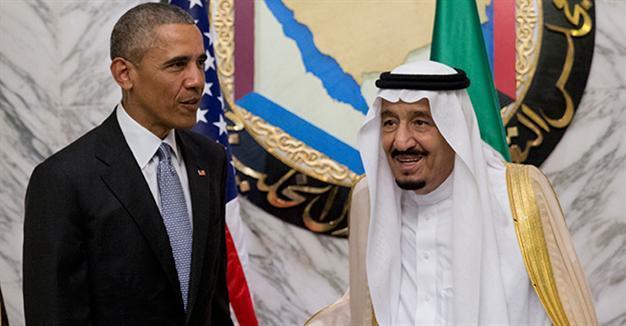US, Gulf states united in goal to ‘destroy’ ISIL: Obama
RIYADH

President Barack Obama and Saudi Arabia's King Salman stand together for the Leaders Photo at the Diriyah Palace during the Gulf Cooperation Council Summit in Riyadh, Saudi Arabia, Thursday, April 21, 2016 - AP photo
U.S. President Barack Obama said April 21 that Washington and the Arab monarchies of the Gulf were united in their commitment to defeating the Islamic State of Iraq and the Levant (ISIL).
“We remain united in our fight to destroy [ISIL],” Obama was quoted as saying by AFP in Riyadh at the close of a Gulf Cooperation Council summit on April 21.
“Given the ongoing threats in the region, the United States will continue to increase our security cooperation with our GCC partners including helping them improve their own capacity to defend themselves,” Obama added.
Obama’s visit to Saudi Arabia came at a time when the U.S. Air Force started using its hulking B-52 bombers against ISIL in Iraq and Syria, but the enormous aircraft are only conducting precision strikes, a military spokesman said April 20.
The B-52 Stratofortress – originally designed in the 1950s – became a symbol of U.S. might during the Cold War and the plane was used to conduct carpet bombing in Vietnam.
U.S. Colonel Steve Warren, a Baghdad-based spokesman, said a B-52 was sent April 18 to destroy an ISIL weapons storage facility in the Iraqi town of Qayyarah, about 60 kilometers south of Mosul.
He said use of B-52s would not lead to a greater risk of civilian casualties because the aircraft are only being armed with guided bombs.
“There are memories in the collective unconscious of B-52s, decades ago, doing ... arguably indiscriminate bombing,” Warren said.
“Those days are long gone. The B-52 is a precision strike weapons platform and it will conduct the same type of precision strikes that we have seen for the last 20 months.”
The B-52s are replacing B-1 bombers that had been operating in the region for the past year.
The U.N. envoy for Syria Staffan de Mistura is pointing to “real but modest progress” in the country’s humanitarian situation, even as doubts linger about the future of peace talks in Geneva.
De Mistura told reporters April 21 that 515 people were medically evacuated a day earlier from four Syrian municipalities: Zabadani, Madaya, Kafraya and Foua.
He also announced a “fact-finding” mission is seeking to arrange deliveries of humanitarian aid to the besieged Damascus suburb of Daraya, something Obama has publicly called for. De Mistura credits Russia for “arguing in favor” of the convoy.
De Mistura said he planned to nominate an unspecified “very effective person” to focus on the critical question of the thousands of detainees held Syria – a major issue for the opposition.
Meanwhile, Syrian opposition negotiator Mohammad Alloush, representing Jaish al-Islam, a major rebel group, said on April 21 peace talks in Geneva could only resume if the government stopped massacres and released thousands of prisoners.
“We say to [government negotiator Bashar] Ja’afari, if he wants a real national unity government, first he must release the 10,000 women in his prisons, and the tens of thousands more there,” Alloush said before leaving the Geneva talks.
“And [he must] stop the massacres he is committing every day, so he can be a human with an ounce of nationalism. Then maybe the negotiations will resume,” he said.
Ben Rhodes, deputy national security adviser to Obama, said on April 21 that the U.S. was concerned about reports that Russia was moving more military materiel into Syria.
A U.S. official said on the same day that Russia was repositioning artillery to northern Syria, including near the city of Aleppo, in a move that is stoking U.S. concern about what Russian-backed Syrian forces intend to do next.
Although Russia pulled out about half of its fixed-wing aircraft in mid-March, it broadly preserved its capabilities within Syria and remains a potent military force in support of Syrian President Bashar al-Assad, U.S. officials said.
At least 40 pro-Syrian government fighters surrendered to Kurdish forces in the city of Qamishli in mostly Kurdish-controlled Hasaka province April 21, a Reuters witness said.
The pro-government forces had been holed up in a prison that is now under the control of the Kurdish security forces. Gunfire could still be heard in the city after rare violence erupted between the two sides late the day before.
The Syrian Observatory for Human Rights, a British-based group tracking violence across the country, said dozens of pro-government fighters had handed themselves over to the Kurds at the prison.
It said clashes had resumed after a pause in the fighting in Qamishli, and reported an explosion that was likely to have been from a car bomb.
Violence erupted on April 20 between Kurdish groups and government forces, killing several people, the observatory reported.
